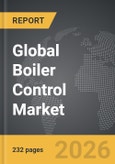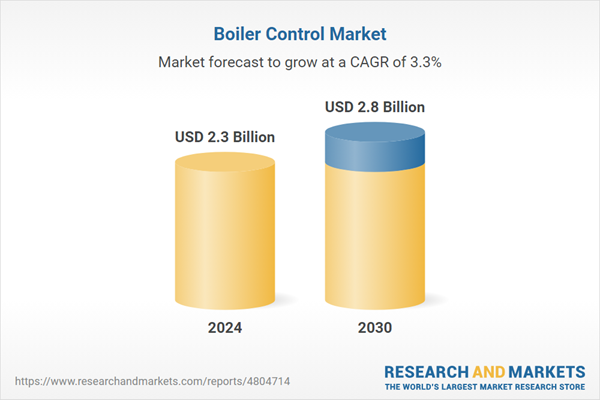Global Boiler Control Market - Key Trends and Drivers Summarized
Why Is Boiler Control So Crucial in Modern Industry?
Boiler control systems are the backbone of modern industrial processes. These systems manage the operation of boilers by monitoring and controlling the temperature, pressure, and other key parameters to ensure optimal performance. Boilers are integral in generating steam or hot water for a multitude of applications, from power generation to heating systems in residential and commercial buildings. The efficiency and safety of these systems depend heavily on precise control mechanisms. These mechanisms reduce the risk of overheating, fuel wastage, and potential failures, which could lead to catastrophic outcomes in critical industrial settings. Moreover, advanced boiler control systems incorporate automated feedback loops and real-time data analysis to optimize performance, leading to reduced operational costs and enhanced energy efficiency. This need for precision in operations makes boiler control systems indispensable in industries where reliability and safety are paramount.How Do Technological Advances Shape Boiler Control Systems?
In recent years, the integration of IoT (Internet of Things), AI (Artificial Intelligence), and machine learning into boiler control systems has revolutionized the industry. IoT-enabled sensors and devices allow for continuous real-time monitoring of boiler conditions, leading to predictive maintenance and proactive management of potential issues before they escalate into costly failures. AI and machine learning algorithms analyze vast amounts of operational data to optimize fuel usage, predict maintenance needs, and even automate the control of boilers based on changing environmental and operational conditions. This level of sophistication not only enhances the efficiency and lifespan of boiler systems but also aligns with the global push towards sustainability by reducing carbon footprints. The adoption of these advanced technologies is reshaping how industries approach boiler control, making processes smarter, more efficient, and significantly more reliable.Why Is Compliance Becoming More Critical in Boiler Control?
As industries face increasingly stringent environmental regulations, the importance of compliance has grown exponentially. Boiler systems are significant contributors to industrial emissions, and as such, there is a heightened focus on controlling and reducing these emissions. Modern boiler control systems are designed with compliance in mind, integrating advanced features that monitor and control emissions levels in real-time. These systems ensure that boilers operate within the limits set by environmental regulations, thus avoiding penalties and contributing to a cleaner environment. Moreover, regulatory bodies are mandating the adoption of more efficient and low-emission technologies, pushing industries to upgrade their boiler control systems. This compliance-driven evolution not only helps companies avoid legal and financial repercussions but also enhances their reputation as responsible corporate citizens. The intersection of regulatory demands and technological advancements is, therefore, a key driver in the development and adoption of modern boiler control systems.What Is Driving the Growth of the Boiler Control Market?
The growth in the boiler control market is driven by several factors, each contributing to the expanding adoption of advanced systems across various industries. One of the primary drivers is the increasing demand for energy-efficient solutions that help industries reduce operational costs and minimize environmental impact. As energy prices continue to rise, industries are looking for ways to optimize fuel consumption, and advanced boiler control systems provide a solution by enabling precise control over combustion processes. Additionally, the growing focus on sustainability and reducing greenhouse gas emissions has led to a surge in demand for boiler control systems that can meet stringent environmental standards. The rapid industrialization in emerging economies, coupled with the modernization of existing infrastructure in developed regions, is further fueling market growth. Moreover, the shift towards smart and automated industrial processes is driving the adoption of IoT-enabled and AI-driven boiler control systems, which offer unparalleled efficiency and reliability. These systems are increasingly being adopted in sectors such as power generation, oil and gas, and manufacturing, where the need for reliable and efficient energy solutions is paramount. Lastly, the aging infrastructure in many developed countries is leading to a growing need for retrofitting and upgrading existing boiler systems, which is also contributing to the expansion of the boiler control market.Report Scope
The report analyzes the Boiler Control market, presented in terms of market value (USD). The analysis covers the key segments and geographic regions outlined below.- Segments: Control (On / Off, Modulating); Component (Hardware, Software); End-Use (Industrial, Commercial).
- Geographic Regions/Countries: World; United States; Canada; Japan; China; Europe (France; Germany; Italy; United Kingdom; Spain; Russia; and Rest of Europe); Asia-Pacific (Australia; India; South Korea; and Rest of Asia-Pacific); Latin America (Argentina; Brazil; Mexico; and Rest of Latin America); Middle East (Iran; Israel; Saudi Arabia; United Arab Emirates; and Rest of Middle East); and Africa.
Key Insights:
- Market Growth: Understand the significant growth trajectory of the Boiler Control Hardware segment, which is expected to reach US$1.9 Billion by 2030 with a CAGR of 3%. The Boiler Control Software segment is also set to grow at 3.8% CAGR over the analysis period.
- Regional Analysis: Gain insights into the U.S. market, valued at $606.9 Million in 2024, and China, forecasted to grow at an impressive 5.7% CAGR to reach $562 Million by 2030. Discover growth trends in other key regions, including Japan, Canada, Germany, and the Asia-Pacific.
Why You Should Buy This Report:
- Detailed Market Analysis: Access a thorough analysis of the Global Boiler Control Market, covering all major geographic regions and market segments.
- Competitive Insights: Get an overview of the competitive landscape, including the market presence of major players across different geographies.
- Future Trends and Drivers: Understand the key trends and drivers shaping the future of the Global Boiler Control Market.
- Actionable Insights: Benefit from actionable insights that can help you identify new revenue opportunities and make strategic business decisions.
Key Questions Answered:
- How is the Global Boiler Control Market expected to evolve by 2030?
- What are the main drivers and restraints affecting the market?
- Which market segments will grow the most over the forecast period?
- How will market shares for different regions and segments change by 2030?
- Who are the leading players in the market, and what are their prospects?
Report Features:
- Comprehensive Market Data: Independent analysis of annual sales and market forecasts in US$ Million from 2024 to 2030.
- In-Depth Regional Analysis: Detailed insights into key markets, including the U.S., China, Japan, Canada, Europe, Asia-Pacific, Latin America, Middle East, and Africa.
- Company Profiles: Coverage of players such as ABB Group, Burnham Commercial, Cleaver-Brooks, Inc., Emerson Electric Co., HBX Control Systems Inc. and more.
- Complimentary Updates: Receive free report updates for one year to keep you informed of the latest market developments.
Some of the 18 companies featured in this Boiler Control market report include:
- ABB Group
- Burnham Commercial
- Cleaver-Brooks, Inc.
- Emerson Electric Co.
- HBX Control Systems Inc.
- Honeywell International, Inc.
- Micromod Automation
- Schneider Electric SE
- Siemens AG
- Spirax-Sarco Ltd.
- Weil-Mclain
- Yokogawa Electric Corporation
This edition integrates the latest global trade and economic shifts into comprehensive market analysis. Key updates include:
- Tariff and Trade Impact: Insights into global tariff negotiations across 180+ countries, with analysis of supply chain turbulence, sourcing disruptions, and geographic realignment. Special focus on 2025 as a pivotal year for trade tensions, including updated perspectives on the Trump-era tariffs.
- Adjusted Forecasts and Analytics: Revised global and regional market forecasts through 2030, incorporating tariff effects, economic uncertainty, and structural changes in globalization. Includes historical analysis from 2015 to 2023.
- Strategic Market Dynamics: Evaluation of revised market prospects, regional outlooks, and key economic indicators such as population and urbanization trends.
- Innovation & Technology Trends: Latest developments in product and process innovation, emerging technologies, and key industry drivers shaping the competitive landscape.
- Competitive Intelligence: Updated global market share estimates for 2025, competitive positioning of major players (Strong/Active/Niche/Trivial), and refined focus on leading global brands and core players.
- Expert Insight & Commentary: Strategic analysis from economists, trade experts, and domain specialists to contextualize market shifts and identify emerging opportunities.
Table of Contents
Companies Mentioned (Partial List)
A selection of companies mentioned in this report includes, but is not limited to:
- ABB Group
- Burnham Commercial
- Cleaver-Brooks, Inc.
- Emerson Electric Co.
- HBX Control Systems Inc.
- Honeywell International, Inc.
- Micromod Automation
- Schneider Electric SE
- Siemens AG
- Spirax-Sarco Ltd.
- Weil-Mclain
- Yokogawa Electric Corporation
Table Information
| Report Attribute | Details |
|---|---|
| No. of Pages | 232 |
| Published | January 2026 |
| Forecast Period | 2024 - 2030 |
| Estimated Market Value ( USD | $ 2.3 Billion |
| Forecasted Market Value ( USD | $ 2.8 Billion |
| Compound Annual Growth Rate | 3.3% |
| Regions Covered | Global |









